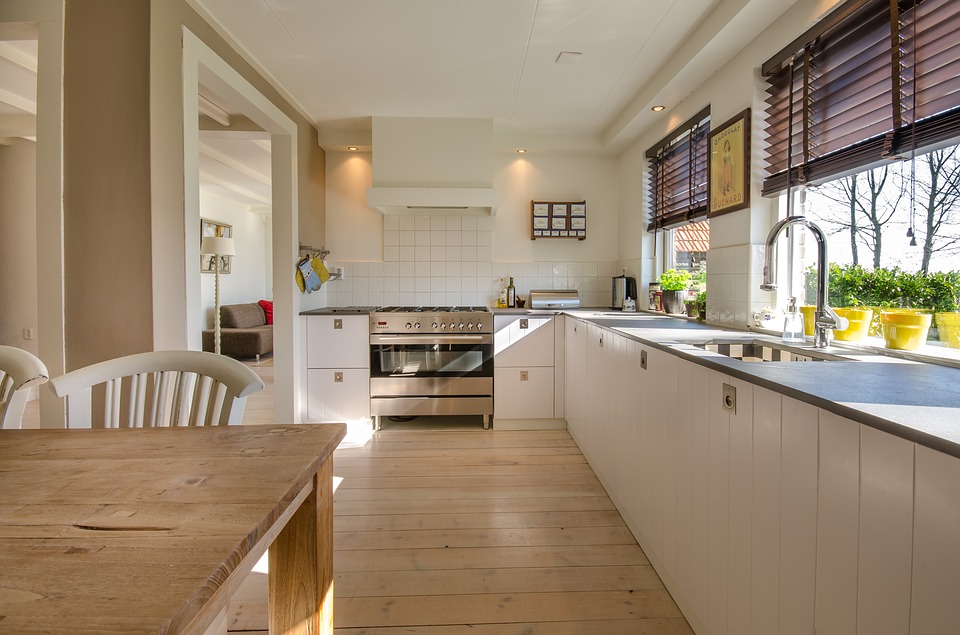
The kitchen is one of the most used rooms in the house, and as such, it gathers a lot of dirt and clutter regularly. If you want to maintain a spotless kitchen, here are some essential cleaning tips you should take note of:
- Start with your sink and dishwasher. Empty your sink and dishwasher before washing anything else in your kitchen. This is because you’ll probably need water to clean your dirty cleaning cloths, and you don’t want to add more mess to an already piled up sink. In addition, clearing out your dishwasher first allows you to load dishes and cooking tools right after using them, providing for an easier cleanup. Make sure to wash your sink after you wash the dishes.
- Always clean countertops. You might be shocked to learn that counter tops can actually gather more dirt and germs than your kitchen floor. Clean your counters with an effective cleaner every day to keep away stains and prevent germs from spreading. Use a microfiber cleaning cloth to wipe away dust and liquid spills, and wash the cloth immediately after every use. Counter tops must be kept clean at night so that they don’t attract insects and vermin.
- Mop the floor regularly. Kitchen floors are understandably dirty since they gather crumbs, spills, and dirt every time someone uses the kitchen. You’ll want to keep your kitchen floor in check, especially if you have children. Mop the floor every time something spills to avoid ants and cockroaches from feasting on the fluid or its residue. Before you sleep, mop it again to keep it spotless and fresh looking in the morning.
- Remove stains. Surfaces such as counters, walls, and floors are never safe from unsightly stains and spills, and they can give your kitchen a nasty look for years. Prevent stains by cleaning up spills and fluids immediately. You can also use a mixture of water and baking soda to deal with existing kitchen stains.
- Organize your cabinets. In order to make your kitchen more conducive to cooking, you need to organize your tools and supplies. The first thing you have to do is to pack up or give away items that you don’t use often and discard items like leaky containers and cracked mugs. Next, group things according to use. This way, you’ll have an easier time looking for the tools, utensils, and ingredients you need.
- Clean your refrigerator regularly. Once a month, check the contents of your refrigerator and throw away expired items. Wash its removable parts and use a dedicated toothbrush for the grooves or wheels. Wipe down the walls with water and baking soda, too, to get rid of grime and discoloration. Rinse or wipe jars and containers before returning them inside your refrigerator.
- Arrange your pantry. Like your refrigerator, check your pantry regularly for expired items and wipe or rinse grimy jars and containers. Set aside items for storage and keep everyday ingredients within easy reach.
- Polish your cookware once a month. Clean burn stains and rust spots from your pots and pans. Boil water in them to remove food stains and brush the outside with water and baking soda. Sharpen and polish your knives regularly to keep them sharp, clean, and shiny as new. Use lemon slices as a food-safe cleaner for your knives.
- Oil your cutting boards. Oiling your cutting boards only takes less than five minutes but this little task can save you a bit of money. Well cared for cutting boards do not need to be replaced often. Mineral oil is a popular and affordable choice for oiling wooden boards, plus it’s also food grade so it’s safe to use. For best results, apply the oil in the evening and leave overnight. Wipe away excess oil in the morning.
- Use the right size for trash cans and recycling containers. Make sure these are big enough to accommodate the volume of trash that you accumulate every day. After all, you don’t want to replace your trash bag more than once a day or let your excess trash pile up on your kitchen counters.
After a thorough cleaning session, consider adopting daily cleaning habits that will help you keep your kitchen looking its best. Dealing with messes immediately instead of letting them pile up can go a long way in improving your kitchen’s look and atmosphere. Follow these tips consistently and you might even find yourself looking forward to spending more time in your kitchen.
